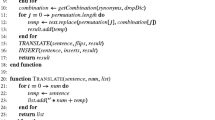Abstract
Extracting useful insights with sentiment analysis is of increasing importance due to the growing availability of user-generated content. Sentiment analysis usually involves multiple different domains, and the labeled data is often difficult to obtain. In this paper we propose a hierarchical adversarial neural network (HANN) for adaptive sentiment analysis. Unlike most existing deep learning based methods, the proposed method HANN is able to share information between multiple domains bidirectionally, not just transfers information from source domain to target domain in one direction only. In particular, the HANN method is inspired by the ideas of hierarchical Bayesian modeling and generative adversarial networks. We introduce each domain a distinct encoder to model the domain-specific distribution of the latent features. The learning procedures on different domains are coupled by a discriminator network to propagate the information, which can be viewed as adversarial networks in a supervised context by forcing the discriminator to identify domain labels. The proposed method HANN not only captures the distinct properties of each domain, but also shares common information across multiple domains. We demonstrate the superior performance of our method on real data including the Amazon review dataset and the Sanders Twitter sentiment dataset.
Access this chapter
Tax calculation will be finalised at checkout
Purchases are for personal use only
Similar content being viewed by others
References
Blitzer, J., Dredze, M., Pereira, F.: Biographies, bollywood, boomboxes and blenders: domain adaptation for sentiment classification. In: Proceedings of the 45th Annual Meeting of the Association of Computational Linguistics, pp. 440–447 (2007)
Courty, N., Flamary, R., Habrard, A., Rakotomamonjy, A.: Joint distribution optimal transportation for domain adaptation. In: NIPS, vol. 30 (2017)
Dai, A.M., Le, Q.V.: Semi-supervised sequence learning. In: Advances in Neural Information Processing Systems, vol. 28 (2015)
Erhan, D., Bengio, Y., Courville, A., Manzagol, P.A., Vincent, P., Bengio, S.: Why does unsupervised pre-training help deep learning? JMLR 11, 625–660 (2010)
Evgeniou, T., Pontil, M.: Regularized multitask learning. In: Proceedings of the 10th ACM SIGKDD International Conference on Knowledge Discovery and Data Mining, pp. 109–117 (2004)
Fasano, G., Franceschini, A.: A multidimensional version of the kolmogorov-smirnov test. Mon. Notices R. Astron. Soc. 225, 155–170 (1987)
Ganin, Y., Ustinova, E., Ajakan, H., Germain, P., Larochelle, H., Laviolette, F., Marchand, M., Lempitsky, V.: Domain-adversarial training of neural networks. J. Mach. Learn. Res. 17(59), 1–35 (2016)
Gers, F.A., Schmidhuber, J., Cummins, F.: Learning to forget: continual prediction with lstm. Neural Comput. 12(10), 2451–2471 (2000)
Glorot, X., Bordes, A., Bengio, Y.: Domain adaptation for large-scale sentiment classification: a deep learning approach. In: ICMLs (2011)
Goodfellow, I., Pouget-Abadie, J., Mirza, M., Xu, B., Warde-Farley, D., Ozair, S., Courville, A., Bengio, Y.: Generative adversarial nets. In: Advances in Neural Information Processing Systems, vol. 27 (2014)
Graves, A.: Supervised Sequence Labelling with Recurrent Neural Networks. Studies in Computational Intelligence. Springer, Berlin (2012)
Hochreiter, S., Schmidhuber, J.: Long short-term memory. Neural Comput. 9(8), 1735–1780 (1997)
Le, Q.V., Mikolov, T.: Distributed representations of sentences and documents. In: ICML, pp. 1188–1196 (2014)
Li, S., Zong, C.: Multi-domain sentiment classification. In: ACL:HLT, pp. 257–260 (2008)
Li, S.S., Huang, C.R., Zong, C.Q.: Multi-domain sentiment classification with classifier combination. J. Comput. Sci. Technol. 26(1), 25–33 (2011)
Li, Z., Zhang, Y., Wei, Y., Wu, Y., Yang, Q.: End-to-end adversarial memory network for cross-domain sentiment classification. In: Proceedings of the 26th International Joint Conference on Artificial Intelligence, pp. 2237–2243 (2017)
Liu, B.: Sentiment Analysis and Opinion Mining. Morgan & Claypool Publishers (2012)
Liu J, Ji S, Ye J (2009) Multi-task feature learning via efficient l2, 1-norm minimization. In: UAI, pp. 339–348
Long, M., Wang, J., Cao, Y., Sun, J., Yu, P.: Deep learning of transferable representation for scalable domain adaptation. IEEE Trans. Knowl. Data Eng. 28(8), 2027–2040 (2016)
van der Maaten, L.J.P., Hinton, G.E.: Visualizing high-dimensional data using t-sne. J. Mach. Learn. Res. 9, 2579–2605 (2008)
Mikolov, T., Sutskever, I., Chen, K., Corrado, G.S., Dean, J.: Distributed representations of words and phrases and their compositionality. Adv. Neural Inf. Process. Syst. 26, 3111–3119 (2013)
Odena, A.: Semi-supervised learning with generative adversarial networks. In: Data Efficient Machine Learning Workshop at ICML 2016 (2016)
Pang, B., Lee, L.: Opinion mining and sentiment analysis. Found. Trends Inf. Retr. 2(1–2), 1–135 (2008)
Pennington, J., Socher, R., Manning, C.: Glove: global vectors for word representation. In: EMNLP, pp. 1532–1543 (2014)
Socher, R., Perelygin, A., Wu, J.Y., Chuang, J., Manning, C.D., Ng, A., Potts, C.: Recursive deep models for semantic compositionality over a sentiment treebank. In: EMNLP, pp. 1631–1642 (2013)
Sutskever, I.: Training recurrent neural networks. Ph.D. thesis, University of Toronto (2013)
Wu, F., Huang, Y.: Collaborative multi-domain sentiment classification. In: IEEE International Conference on Data Mining, pp. 459–468 (2015)
Zhao, H., Zhang, S., Wu, G., Costeira, J., Moura, J., Gordon, G.: Multiple source domain adaptation with adversarial training of neural networks (2017)
Zhou, J., Chen, J., Ye, J.: MALSAR: Multi-tAsk Learning via Structural Regularization. Arizona State University (2011)
Acknowledgements
This project has received funding from the European Union’s Horizon 2020 research and innovation programme under grant agreement No 766186.
Author information
Authors and Affiliations
Corresponding author
Editor information
Editors and Affiliations
Rights and permissions
Copyright information
© 2020 Springer Nature Switzerland AG
About this chapter
Cite this chapter
Xu, Z., von Ritter, L., Serra, G. (2020). Hierarchical Adversarial Training for Multi-domain Adaptive Sentiment Analysis. In: Appice, A., Ceci, M., Loglisci, C., Manco, G., Masciari, E., Ras, Z. (eds) Complex Pattern Mining. Studies in Computational Intelligence, vol 880. Springer, Cham. https://doi.org/10.1007/978-3-030-36617-9_2
Download citation
DOI: https://doi.org/10.1007/978-3-030-36617-9_2
Published:
Publisher Name: Springer, Cham
Print ISBN: 978-3-030-36616-2
Online ISBN: 978-3-030-36617-9
eBook Packages: Intelligent Technologies and RoboticsIntelligent Technologies and Robotics (R0)




